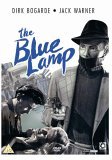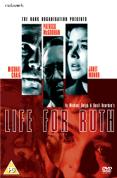![Pool Of London [Blu-ray] [2016]](/pictures/1148894.jpg) Pool Of London | Blu Ray | (24/10/2016)
from £10.99
| Saving you £N/A (N/A%)
| RRP
Pool Of London | Blu Ray | (24/10/2016)
from £10.99
| Saving you £N/A (N/A%)
| RRP Directed by Basil Dearden, 1951 Ealing classic Pool of London has been stunningly restored. Filmed on location in the City of London itself, on the River Thames and its wharves, on London Bridge and in the blitzed streets around St. Paul's, this is an authentic and unmissable slice of film history. Everything changes for two sailors on shore leave when they inadvertently become caught up in a crime as murky as the great river itself. For one of them, Johnny, life is further complicated when he falls in love with Pat, a local ticket seller, forming one of the first inter-racial relationships in British film. EXTRAS: Locations Featurette With Richard Dacre New Interview With Earl Cameron Stills Gallery
![Man in the Moon [DVD]](/pictures/1140662.jpg) Man in the Moon | DVD | (19/09/2016)
from £12.98
| Saving you £-1.00 (N/A%)
| RRP
Man in the Moon | DVD | (19/09/2016)
from £12.98
| Saving you £-1.00 (N/A%)
| RRP British film icon Kenneth More stars opposite Shirley Anne Field and Michael Hordern in this madcap sci-fi satire from director Basil Dearden. Scripted by Oscar nominees Michael Relph and Bryan Forbes, Man in the Moon is featured here in a brand-new transfer from the original film elements in its as-exhibited aspect ratio. William Blood is Mr Normal, yet he's also rather strange: his immunity to illness and inability to worry enable him to make a living as a human guinea pig. A team of 'NASTI' scientists have an extraordinary mission lined up for William, however rather than risk the lives of highly trained astronauts (or test animals!), they want to send him to the Moon... SPECIAL FEATURES: Image gallery Original pressbook PDF Original theatrical trailer
![Pool Of London [DVD] [2016]](/pictures/1148849.jpg) Pool Of London | DVD | (24/10/2016)
from £7.99
| Saving you £N/A (N/A%)
| RRP
Pool Of London | DVD | (24/10/2016)
from £7.99
| Saving you £N/A (N/A%)
| RRP Directed by Basil Dearden, 1951 Ealing classic Pool of London has been stunningly restored. Filmed on location in the City of London itself, on the River Thames and its wharves, on London Bridge and in the blitzed streets around St. Paul's, this is an authentic and unmissable slice of film history. Everything changes for two sailors on shore leave when they inadvertently become caught up in a crime as murky as the great river itself. For one of them, Johnny, life is further complicated when he falls in love with Pat, a local ticket seller, forming one of the first inter-racial relationships in British film. EXTRAS: Locations Featurette With Richard Dacre New Interview With Earl Cameron Stills Gallery
![Violent Playground [DVD]](/pictures/1113338.jpg) Violent Playground | DVD | (16/01/2012)
from £8.15
| Saving you £4.84 (59.39%)
| RRP
Violent Playground | DVD | (16/01/2012)
from £8.15
| Saving you £4.84 (59.39%)
| RRP Struggle between a Liverpool Juvenile Liaison officer and a young and dangerous pyromaniac.
![The Bells Go Down [DVD] [1943]](/pictures/1102077.jpg) The Bells Go Down | DVD | (19/07/2010)
from £9.56
| Saving you £6.43 (67.26%)
| RRP
The Bells Go Down | DVD | (19/07/2010)
from £9.56
| Saving you £6.43 (67.26%)
| RRP The Bells Go Down
 The Blue Lamp | DVD | (21/08/2006)
from £18.70
| Saving you £-5.71 (N/A%)
| RRP
The Blue Lamp | DVD | (21/08/2006)
from £18.70
| Saving you £-5.71 (N/A%)
| RRP The unending battle of the city streets. When PC George Dixon is shot whilst on duty the Paddington Green police investigate the West London underworld to bring the culprit to justice...
![The Smallest Show On Earth [1957]](/pictures/1012773.jpg) The Smallest Show On Earth | DVD | (08/07/2002)
from £19.37
| Saving you £-6.38 (N/A%)
| RRP
The Smallest Show On Earth | DVD | (08/07/2002)
from £19.37
| Saving you £-6.38 (N/A%)
| RRP An amiable knock-off of the Ealing comedy style, The Smallest Show on Earth starts with aspiring novelist Bill Travers and his "nice gel" wife Virginia McKenna inheriting a cinema from a hitherto unknown uncle and discovering that it isn't the sumptuous modern Grand, which specialises in those "smash 'em in the face, knock 'em over the waterfront" pictures, but the decrepit Bijou, known locally as "the fleapit". The initial plan, set up by lawyer Leslie Phillips, is to sell off the cinema to the owner of the Grand so he can knock it down to make a car park, but our heroes are put off by the arrogant bullying of the rival manager (Francis De Wolff) and succumb to the inept charms of the crazed, aged staff--drunken projectionist Peter Sellers, doddery commissionaire Bernard Miles and dotty ticket lady Margaret Rutherford (who joined the team as a piano accompanist). In the 1950s, there was a run of gentle British comedies in which outmoded and broken-down local institutions (steam trains, tugboats, vintage cars) were saved by collections of committed eccentrics who despised the new-fangled bus services or soulless council bureaucracies and were willing to resort to a little larceny (in this case, arson). The Smallest Show slots in perfectly with the cycle, getting laughs from the Bijou's already outmoded programme of scratchy Westerns and desert dramas (which increase ice cream sales) and sentiment over the staff's midnight screenings of silent movies that remind them of better days. It's likeable rather than hilarious, with Sellers and Miles buried under crepe hair and fake wrinkles competing to out-dodder each other and losing the picture to the inimitable Rutherford, who doesn't have to fake her eccentricity. Pin-up, June Cunningham, is the glamorous usherette and Sid James plays her annoyed Dad. On the DVD: The Smallest Show on Earth is presented in a decent print, but with no extras. The film is also available as part of the four-disc Peter Sellers Collection. --Kim Newman
![The Captive Heart (Digitally Restored) [Blu-ray] [2015]](/pictures/1138042.jpg) The Captive Heart (Digitally Restored) | Blu Ray | (04/01/2016)
from £10.99
| Saving you £12.00 (109.19%)
| RRP
The Captive Heart (Digitally Restored) | Blu Ray | (04/01/2016)
from £10.99
| Saving you £12.00 (109.19%)
| RRP Ealing studios' output from the 1940s and 1950s helped define what was arguably the golden age for British cinema. THE CAPTIVE HEART, released in 1946, comes from this legendary studio. Starring a host of Ealing favourites, including Michael Redgrave, Basil Radford and Jack Warner, THE CAPTIVE HEART is the story of a group of British prisoners of War, captured after Dunkirk in 1940. Amongst them is a man known as Captain Geoffrey Mitchell who has assumed the identity of a dead man after escaping from the Marlag and Milag North concentration camp. With exposure seeming inevitable, the man seeks desperately to escape the camp and therefore the fate which awaits him.
![The Gentleman Gunmen [DVD]](/pictures/1105308.jpg) The Gentleman Gunmen | DVD | (07/03/2011)
from £N/A
| Saving you £N/A (N/A%)
| RRP
The Gentleman Gunmen | DVD | (07/03/2011)
from £N/A
| Saving you £N/A (N/A%)
| RRP Set during the Second World War two Irish brothers arrive in London to launch an IRA bombing campaign but one of them begins to have doubts about their mission. John Mills and Dirk Bogarde play the brothers.
![The Persuaders!: The Complete Series - [ITV] - [Network] - [Blu-ray] [DVD]](/pictures/1110278.jpg) The Persuaders!: The Complete Series - | Blu Ray | (19/09/2011)
from £N/A
| Saving you £N/A (N/A%)
| RRP
The Persuaders!: The Complete Series - | Blu Ray | (19/09/2011)
from £N/A
| Saving you £N/A (N/A%)
| RRP Two millionaire playboys - one a peer of the realm, born into money, and the other a self-made man who fought his way out of the New York slums - are conned by a retired judge into righting wrongs in a series that combines action, style, humour and panache in large quantities!Regarded by many as being the finest of Lew Grade's ITC film series, The Persuaders! stars Roger Moore and Tony Curtis as the mismatched playboys with an eye for the ladies and a penchant for landing themselves in trouble.Highly anticipated on Blu-ray, this very popular action adventure series is presented here in stunning High Definition for the first time. All 24 episodes are featured alongside a wealth of special features.
 Alastair Sim - The Comic Icons Collection | DVD | (29/10/2007)
from £41.97
| Saving you £-6.98 (N/A%)
| RRP
Alastair Sim - The Comic Icons Collection | DVD | (29/10/2007)
from £41.97
| Saving you £-6.98 (N/A%)
| RRP Titles Comprise: The Green Man (Dir. Robert Day/Basil Dearden 1956) Folly To Be Wise (Dir. Frank Launder 1953) Geordie (Dir. Frank Launder 1955) Left Right And Centre (Dir. Sidney Gilliat 1959) Laughter in Paradise (Dir. Mario Zampi 1951)
![Blue Lamp, The / The Nanny [1965]](/pictures/1012436.jpg) Blue Lamp, The / The Nanny | DVD | (23/06/2003)
from £14.99
| Saving you £1.00 (6.67%)
| RRP
Blue Lamp, The / The Nanny | DVD | (23/06/2003)
from £14.99
| Saving you £1.00 (6.67%)
| RRP This is a double-feature of two British crime classics, The Blue Lamp (1949) and The Nanny (1965). The Blue Lamp is the film that introduced PC George Dixon, played by Jack Warner, later immortalised in the BBC's long-running Dixon of Dock Green (1955-76). Here Dixon's murder is the catalyst for an exciting London manhunt, shot largely on location in a fast-moving, starkly efficient style showing the influence of The Naked City (1948). The war-damaged East End and the car chases through almost vehicle-free streets offer a documentary-like vision of a London now long gone, and a young Dirk Bogarde makes a serious impact in an early starring role. In contrast, The Nanny has a superstar, the imported Hollywood legend Bette Davis, in the declining years of her career. Just one of three psychological thrillers Hammer produced in 1965 (the others were Frantic and Hysteria), the film capitalises on the popularity of Davis's Whatever Happened to Baby Jane? (1962) with a comparable mix of hateful insanity and paranoia. The screenplay skilfully juggles the audience's sympathies between a superb Davis and the dysfunctional family of which she becomes a part, developing a powerful sense of dread which shows such clichéd later fare as The Hand That Rocks the Cradle (1992) how to do this sort of thing with real class. On the DVD: The Blue Lamp and The Nanny are presented in black and white with adequate mono sound. The Blue Lamp is in its original 4:3 ratio; The Nanny is cropped from its theatrical 1.85:1 to 4:3, though it's only in a few shots that it becomes obvious that information is missing at the sides of the screen. The print of The Blue Lamp is soft and grainy, while The Nanny is grainy with a considerable amount of flicker. There are no extras. --Gary S. Dalkin
![Saraband For Dead Lovers [1948]](/pictures/1067132.jpg) Saraband For Dead Lovers | DVD | (07/05/2007)
from £10.35
| Saving you £2.64 (25.51%)
| RRP
Saraband For Dead Lovers | DVD | (07/05/2007)
from £10.35
| Saving you £2.64 (25.51%)
| RRP A romance that rocked the thrones of kings. A historical romance of star-crossed lovers set in the days of George I based on the novel by Helen Simpson.
![The Rainbow Jacket [DVD] [1954]](/pictures/1098046.jpg) The Rainbow Jacket | DVD | (01/03/2010)
from £N/A
| Saving you £N/A (N/A%)
| RRP
The Rainbow Jacket | DVD | (01/03/2010)
from £N/A
| Saving you £N/A (N/A%)
| RRP A champion jockey that is banned from racing dedicates his efforts to training a youngster to become the next champion.
 Life For Ruth | DVD | (25/06/2007)
from £6.79
| Saving you £4.46 (80.65%)
| RRP
Life For Ruth | DVD | (25/06/2007)
from £6.79
| Saving you £4.46 (80.65%)
| RRP A young girl Ruth (Lynn Taylor) is injured in a boating accident and taken to hospital for what is regarded as a routine emergency. Her parents are informed that only a blood transfusion will save her life but her religious fundamentalist father John Harris (Michael Craig) ignores the doctors advice and forbids the procedure believing that God will inexplicably heal his daughter. His embittered wife Pat (Janet Munro) who has tolerated her husband's religious convictions throughout their marriage finally relents and signs the required papers but sadly too late and their daughter dies. The angry Dr. Brown (Patrick McGoohan) decides to press ahead with manslaughter charges against Harris and the case quickly comes to the law courts. After a lengthy and emotional trial Harris is eventually acquitted. Though a free man he must come to terms with his own conflicting feelings over his faith and his daughter's death.
![Pool Of London [DVD] [1951]](/pictures/1094718.jpg) Pool Of London | DVD | (17/08/2009)
from £N/A
| Saving you £N/A (N/A%)
| RRP
Pool Of London | DVD | (17/08/2009)
from £N/A
| Saving you £N/A (N/A%)
| RRP Pool Of London
![The League Of Gentlemen [1960]](/pictures/1013192.jpg) The League Of Gentlemen | DVD | (15/01/2001)
from £14.98
| Saving you £0.01 (0.07%)
| RRP
The League Of Gentlemen | DVD | (15/01/2001)
from £14.98
| Saving you £0.01 (0.07%)
| RRP The League of Gentlemen is a sardonic crime drama in which Jack Hawkins plays an embittered retired army officer who recruits seven fellow ex-soldiers to carry out a bank raid with military precision. The film presents an England between post-war austerity and the more liberated 1960s where traditional moral certainties were rapidly being discarded; a London where ex-officers left on the scrapheap at war's end could justify turning their military experience to armed robbery. Unfortunately the tale is neither particularly amusing or thrilling, with an overlong central detour via an army camp prefacing the exciting heist and a largely anti-climactic ending. Nevertheless Hawkins effectively subverts his heroic officer type from The Cruel Sea (1953) and The Bridge on the River Kwai (1957), and there's excellent support from a great cast including Nigel Patrick, Richard Attenborough and Roger Livesey. Bryan Forbes not only wrote the cynical screenplay but costarred with wife Nanette Newman in her first significant screen role. More influential than truly classic, The League of Gentlemen has lent its name to a modern BBC comedy, an "Extraordinary" comic strip-turned-movie, and proved the template for heist films ever since, including both versions of The Italian Job (1969 and 2003). On the DVD:The League of Gentlemen is presented in an anamorphically enhanced 16:9 transfer from an excellent condition print and mostly looks and sounds fine. There's minimal print damage, though sadly Philip Green's ironically patriotic main title music suffers from significant distortion. The only extra is the original trailer, which is now something of a period piece itself. --Gary S Dalkin
![Great British Crime Box Set [DVD]](/pictures/1126493.jpg) Great British Crime Box Set | DVD | (31/03/2014)
from £8.39
| Saving you £12.86 (180.37%)
| RRP
Great British Crime Box Set | DVD | (31/03/2014)
from £8.39
| Saving you £12.86 (180.37%)
| RRP This fine collection of Crime films from the 1950’s and 1960’s stars some of Britain’s finest actors including Stanley Baker Joan Collins Yvonne Mitchell James Robertson Justice and Nigel Patrick. The Informers (1963) sees Scotland Yard battle organised crime in this tough Police drama a forerunner to the 1970’s TV series ‘The Sweeney’. Checkpoint (1956) stars Stanley Baker in a taut industrial espionage thriller set in the world of sports car racing. An attempt to headhunt an Italian car designer ends in theft corruption and murder. Sapphire (1959) is a BAFTA winning crime drama directed by Basil Dearden. Nigel Patrick and Michael Craig are Scotland Yard detectives investigating a murder on Hampstead Heath and their enquiries lead them on a manhunt through both the black and white communities where they encounter distrust and prejudice. Turn the Key Softly (1953) starring Joan Collins as one of three women who leave prison on the same day. Over the course of 24 hours each faces a struggle with herself to avoid a return criminal ways.
![The Black Sheep Of Whitehall [DVD]](/pictures/1105275.jpg) The Black Sheep Of Whitehall | DVD | (07/02/2011)
from £9.77
| Saving you £6.22 (63.66%)
| RRP
The Black Sheep Of Whitehall | DVD | (07/02/2011)
from £9.77
| Saving you £6.22 (63.66%)
| RRP Will Hay plays a Professor teaching at a correspondence school who discovers that a Nazi agent is trying to prevent a trade treaty being signed between England and South America. The agent is posing as an economics expert seconded to the trade delegation. The professor must find the real economist and expose the agent.
![Peter Sellers - Hoffman / The Smallest Show On Earth / Carlton-Browne Of The F.O./ Two Way Stretch [1957]](/pictures/1013000.jpg) Peter Sellers - Hoffman / The Smallest Show On Earth / Carlton-Browne Of The F.O./ Two Way Stretch | DVD | (15/10/2001)
from £34.00
| Saving you £-4.01 (N/A%)
| RRP
Peter Sellers - Hoffman / The Smallest Show On Earth / Carlton-Browne Of The F.O./ Two Way Stretch | DVD | (15/10/2001)
from £34.00
| Saving you £-4.01 (N/A%)
| RRP Featuring the films: 'Hoffman' 'The Smallest Show On Earth' 'Carlton-Browne Of The F.O.' and 'Two Way Stretch'. Hoffman *(WS 1.85:1 Anamorphic 1970 1 hour and 47 Minutes Colour): Peter Sellers is Hoffman a middle aged misfit who blackmails his young attractive secretary into spending a week with him. Although he behaves like a creep throughout the weekend he actually emerges as a sympathetic character in the end. Two Way Stretch *(FS 1960 1 hour and 23 minutes B&W):

Please wait. Loading...
This site uses cookies.
More details in our privacy policy